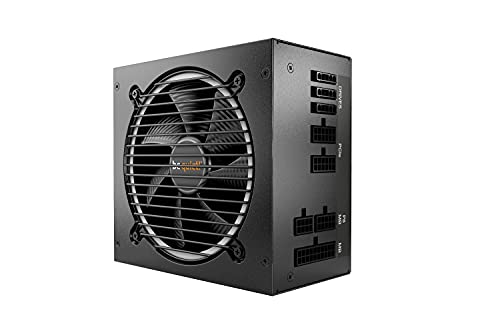Whether you’re building a new PC from scratch or planning to upgrade your current setup, choosing the right PSU is crucial.
This guide is designed to walk you through the top choices available in the market, we hav picked PSUs that offer efficient power delivery and also come with good warranties and some more advanced features like modularity, silent operation, and software control etc.
Let’s delve into the world of gaming power supplies and help you make the right choice for your next build!
Top Picks
- Best Pick: Corsair RM750x is top choice of power supply for gaming. It stands out for its high build quality, Magnetic Bearing Fan, and an impressive ten-year warranty.
- Best 1000w: Seasonic Prime Titanium TX-1000 is our choice of 1KW power supply, lauded for its high performance, silent operation, high-quality components, and a whopping twelve-year warranty.
- Best Budget: XPG Pylon 450 is our budget pick. This PSU impresses with its high build quality, compatibility with the Alternative Sleep Mode, fluid dynamic bearing fan, and a five-year warranty.
- Best Low Capacity: BeQuiet! Pure Power 11 FM 550W takes the title for the best low-capacity PSU. It stands out for its high performance, silent operation, compatibility with the Alternative Sleep Mode, and good build quality.
- Premium Pick: Corsair AX1600i is our premium choice. This PSU offers powerful top performance in all sections, high build quality, silent operation, and software control.
🏆 Corsair RM750x
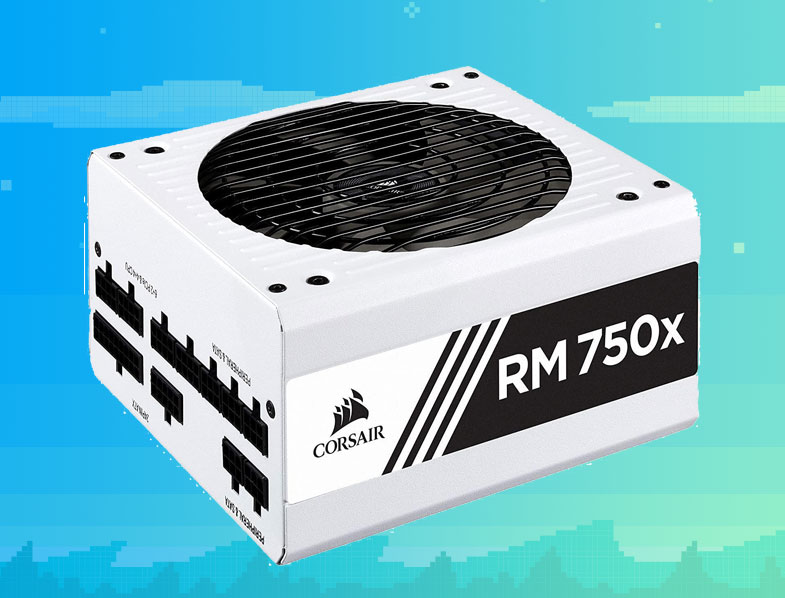
Its construction, managed by CWT, is impeccable, making it exclusive to Corsair. This particular platform integrates capacitors on both primary and secondary sides that are of Japanese origin, ensuring high durability and efficiency. Furthermore, it employs Field-Effect Transistors (FETs) and a magnetic levitation fan that will seamlessly outlive the ten-year warranty that comes with the unit.
One of the primary improvements in this version is the upgraded fan. The magnetic levitation fan boosts dependability and performs effortlessly even under harsh conditions, where many other fans might falter. Given that the fan plays a vital role in determining the overall reliability of the PSU, this feature significantly enhances the product’s value.
However, there are some areas that might require some attention. For instance, the average efficiency could be a tad higher. Additionally, some users might find the in-cable capacitors a bit inconvenient.
Despite these minor drawbacks, the Corsair RM750x stands as a formidable offering in the gaming PSU market. The blend of top-notch performance, durability, and affordability ensures this PSU remains at the top of the pile, setting new standards for the competition to follow.
| 👍 Pros | 👎 Cons |
|---|---|
| High build quality | Average efficiency could be higher |
| Features a magnetic levitation fan | In-cable capacitors might be bothersome |
| Comes with a ten-year warranty | |
| Reasonable pricing for high performance |
🥇 Seasonic Prime Titanium TX-1000
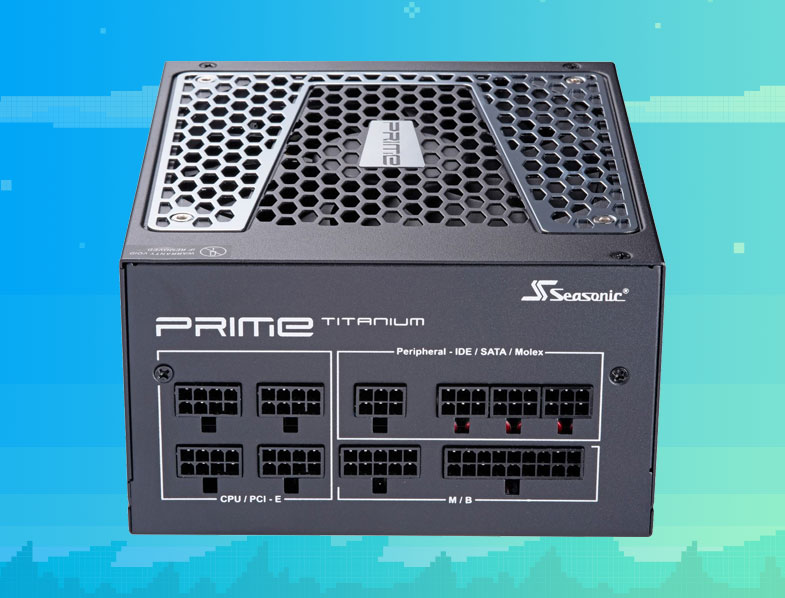
Seasonic’s Prime Titanium TX-1000 power supply unit (PSU) sets the standard for high wattage power supply units, not only due to its power but also due to its exceptionally high efficiency. This PSU boasts a maximum DC output of 1000W, which makes it a viable choice for high-performance gaming and workstation setups.
Seasonic, as an original equipment manufacturer (OEM), has really hit the jackpot with its Prime platform. The Prime Titanium TX-1000 represents the top of the line with its 80 PLUS Titanium rating for power efficiency. This means it offers up to 94% efficiency at 50% load, reducing waste heat and saving on energy costs.
The PSU is equipped with a 135mm Fluid Dynamic Bearing (FDB) fan, which ensures low noise operation even under heavy load, maintaining an optimal balance between cooling and noise level, with a Cybenetics noise rating of A-. Its fully modular design simplifies the building process, allowing for clean builds by using only the necessary cables.
High-quality Japanese capacitors are utilized throughout the unit, providing excellent durability and longevity, further confirmed by the staggering 12-year warranty. This PSU offers 6 PCIe connectors, all on dedicated cables, enabling it to support multiple high-end graphics cards.
However, there are a few minor drawbacks. The high Over-Current Protection (OCP) setting on all rails, particularly the minor ones, might pose an issue in some extreme scenarios. In addition, it has high inrush current with 115V input, which could potentially be problematic. Despite these minor drawbacks, the overall performance and features of this PSU, along with its extensive warranty, outweigh the negatives.
| 👍 Pros | 👎 Cons |
|---|---|
| High maximum DC output of 1000W, suitable for high-performance systems. | High Over-Current Protection (OCP) setting on all rails. |
| 80 PLUS Titanium efficiency rating, offering up to 94% efficiency at 50% load. | High inrush current with 115V input. |
| Low noise operation due to the 135mm Fluid Dynamic Bearing (FDB) fan. | Might be pricey for budget-conscious buyers. |
| Fully modular design for easy and clean builds. | Some users may find the cabling slightly stiff, which could make cable management a bit challenging. |
| High-quality Japanese capacitors ensure durability and longevity. | |
| An impressive 12-year warranty, demonstrating the manufacturer’s confidence in the product. | |
| Support for multiple high-end graphics cards with 6 PCIe connectors on dedicated cables. |
🥇 XPG Pylon 450
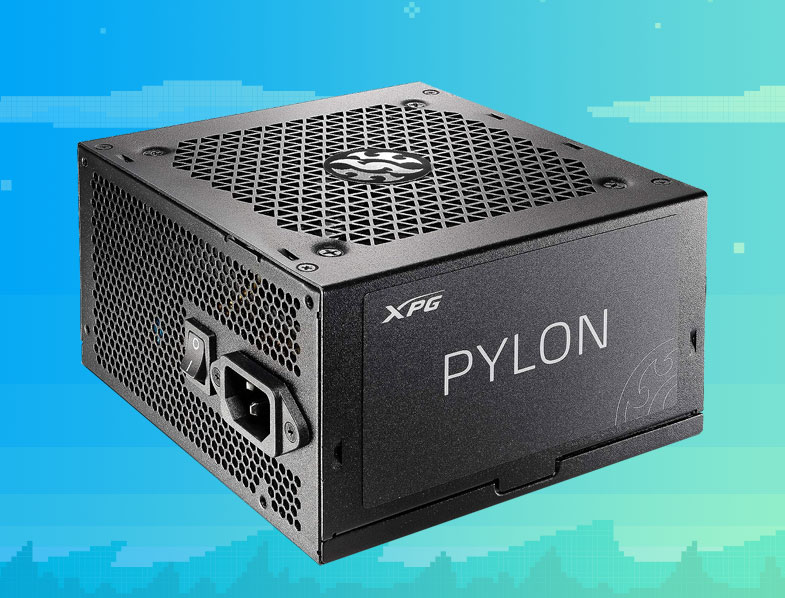
The XPG Pylon 450, a product from the renowned Original Equipment Manufacturer (OEM), CWT, is one of the best affordable PSUs currently available in the market. It comes with a modest maximum DC output of 450W, making it a fitting choice for budget or less demanding systems.
An impressive feature of the Pylon 450 is its 80 PLUS Bronze efficiency certification, ensuring its capability to maintain at least 82% efficiency under typical load conditions. This adds to its value proposition as a cost-effective, yet performance-oriented PSU.
A notable feature is its cooling system, which utilizes a 120mm Fluid Dynamic Bearing (FDB) fan. This enhances the PSU’s durability and reliability, particularly under extensive usage conditions. In terms of acoustics, the PSU keeps a respectable noise level between 25 to 30 dB[A], as determined by the Cybenetics A- rating.
One area where the XPG Pylon 450 could improve is modularity. It comes with a non-modular design which, although not a deal-breaker, could deter some users who prefer the ease and cleanliness of cable management offered by modular PSUs.
Another minor concern is the hold-up time, which is lower than the preferable 17ms, and efficiency below 60% with a 2% load. While these are technical details that won’t impact everyday usage for most users, they’re worth considering for those aiming for maximum performance.
The XPG Pylon 450 gets commendation for its warranty policy. In 2022, XPG upgraded the warranty on all Pylon models to five years. Given the build quality and reliability of the product, the warranty upgrade does make sense and puts the product in a competitive place in the market.
| 👍 Pros | 👎 Cons |
|---|---|
| Affordable, offering good value for its price. | Non-modular design, making cable management more challenging. |
| 80 PLUS Bronze efficiency rating, ensuring decent efficiency. | Hold-up time is slightly lower than the preferable 17ms. |
| Cooling system uses a 120mm Fluid Dynamic Bearing (FDB) fan, enhancing durability and reliability. | Efficiency falls below 60% with a 2% load. |
| Noise level is kept within a reasonable range (25 to 30 dB[A]). | |
| Extended warranty of five years, enhancing its value proposition. |
🥇 BeQuiet! Pure Power 11 FM 550W
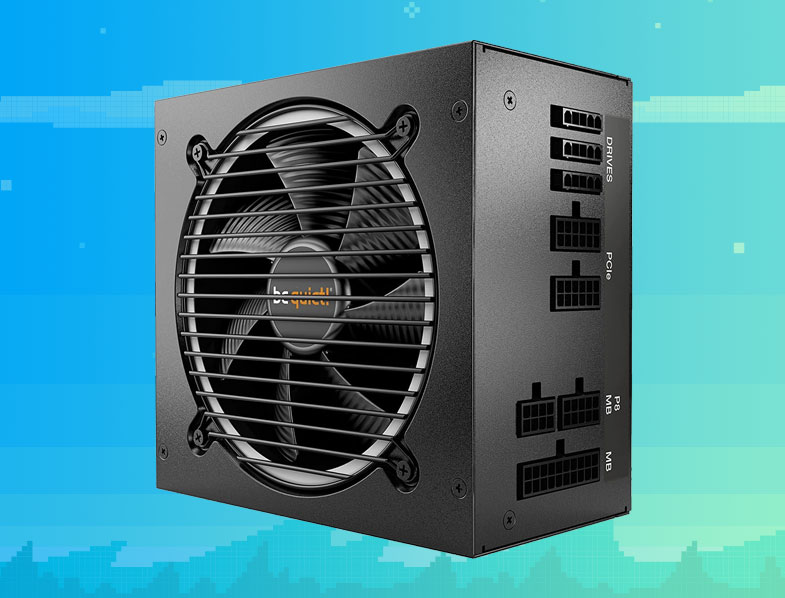
Sporting a fully modular design with an 80 PLUS Gold efficiency rating, the unit is more than capable of powering your PC’s essential components without wasting energy. Its impressive Cybenetics A noise rating attests to the unit’s quiet operation, making it a suitable choice for those seeking a silent PC build.
The unit showcases remarkable build quality, and it’s not shy about its performance either. During testing, the Pure Power 11 FM 550W held its own against competition from big names like Corsair, Seasonic, and EVGA. With a five-year warranty, you get the reassurance of long-term support, even if it’s half of what some competitors offer.
With its compact design and rifle bearing cooling fan, the PSU ensures reliability without compromising on the form factor. However, it does leave something to be desired in terms of Molex connectors.
All in all, the BeQuiet! Pure Power 11 FM 550W is a high-performing power supply unit that ticks all the right boxes for less demanding systems, providing excellent value under the $100 mark.
| 👍 Pros | 👎 Cons |
|---|---|
| Affordable, offering good value for its price. | Non-modular design, making cable management more challenging. |
| 80 PLUS Bronze efficiency rating, ensuring decent efficiency. | Hold-up time is slightly lower than the preferable 17ms. |
| Cooling system uses a 120mm Fluid Dynamic Bearing (FDB) fan, enhancing durability and reliability. | Efficiency falls below 60% with a 2% load. |
| Noise level is kept within a reasonable range (25 to 30 dB[A]). | |
| Extended warranty of five years, enhancing its value proposition. |
🥇 Corsair AX1600i
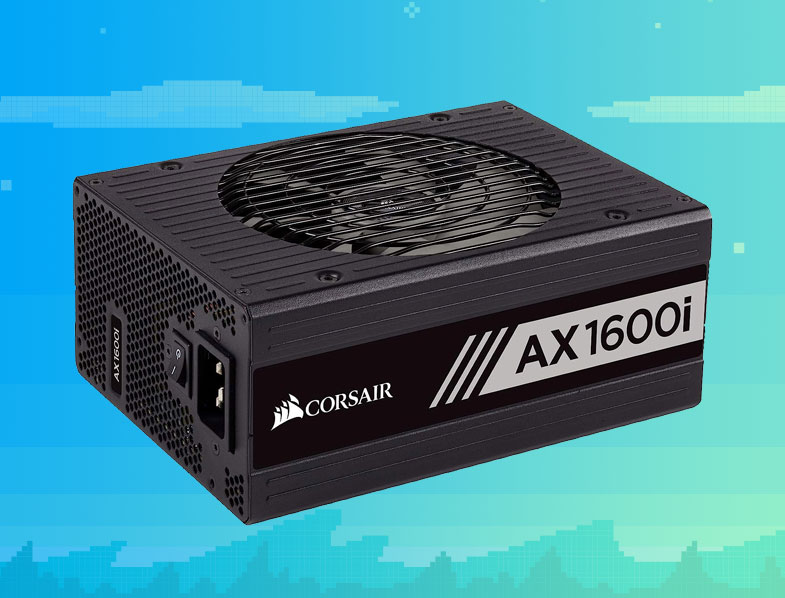
The AX1600i stands tall with its 80 PLUS Titanium efficiency rating, the highest available. This rating means the unit operates with minimal waste, offering superb energy efficiency. In addition, it employs Gallium Nitride (GaN) transistors, which allow for a smaller form factor and better performance compared to traditional silicon transistors.
On the performance front, the AX1600i excels. It boasts tight voltage regulation, impressive ripple suppression, and a robust delivery of power, even at high loads. Its fully modular design ensures flexibility in cable management, and it comes with a large set of cables to cater to all sorts of components.
With the added feature of Corsair’s iCUE support, users can monitor performance, adjust fan speeds, and switch between single and multi-rail modes via software. It’s also very quiet, considering its high capacity, thanks to its 140mm patented FDB cooling fan.
However, superior performance comes with a price, and the AX1600i is no exception. It is one of the most expensive PSUs on the market. Also, the unit’s high capacity may be overkill for most users. But if budget isn’t a concern and you’re seeking the best PSU money can buy for a high-end build, the Corsair AX1600i is hard to beat. The ten-year warranty further solidifies its standing as a reliable and long-lasting choice.
| 👍 Pros | 👎 Cons |
|---|---|
| 80 PLUS Titanium efficiency rating | High price |
| Uses advanced GaN transistors | Overkill for most systems |
| Excellent performance with tight voltage regulation and ripple suppression | |
| Fully modular design for better cable management | |
| Extensive cable set | |
| Corsair iCUE support for performance monitoring and adjustments | |
| Quiet operation, thanks to 140mm FDB cooling fan | |
| 10-year warranty |
Gaming PSU Buyer’s Guide
In this buyer’s guide, we will explore the role of a PSU in a gaming PC, the key features to look for when choosing a PSU, the top brands in the gaming PSU market, and how to choose the right PSU for your gaming PC.
Understanding the Role of a PSU in a Gaming PC
A PSU, or Power Supply Unit, serves as the heart of your gaming PC, providing the necessary power for all the components to operate. It converts the AC power from your wall outlet into DC power that your PC components can use. Without a reliable and efficient PSU, your gaming PC may not perform at its best and can even experience stability issues.
The Basic Function of a PSU
The primary function of a PSU is to convert high-voltage AC power into low-voltage DC power that your gaming PC can use. It accomplishes this by regulating, filtering, and distributing power to different components, such as the motherboard, graphics card, CPU, and storage devices. It ensures that each component receives the appropriate amount of power to operate efficiently.
But how does a PSU actually convert AC power to DC power? Let’s dive a little deeper into the process. Inside the PSU, there are several key components, including transformers, rectifiers, capacitors, and voltage regulators. When you plug in your gaming PC and turn it on, the AC power from the wall outlet enters the PSU.

The transformers then step down the voltage to a lower level, making it safer for the components to handle. Next, the rectifiers convert the AC power into DC power by blocking the negative half of the AC waveform. The capacitors help to stabilize the DC power and filter out any unwanted noise or fluctuations. Finally, the voltage regulators ensure that the DC power output is consistent and within the required voltage range for each component.
Why a Quality PSU Matters for Gaming
When it comes to gaming, the demands on your PSU are significantly higher than for regular desktop use. GPUs, especially high-end ones, require substantial amounts of power to deliver smooth gameplay and graphics. A poor-quality PSU may not be able to handle the power requirements of your components, leading to instability, crashes, and even damage to your hardware.
So, what makes a quality PSU stand out? One important factor is its efficiency. A higher efficiency PSU will waste less energy as heat, resulting in lower electricity bills and a cooler system overall.

Additionally, a quality PSU will have better voltage regulation, ensuring that the power output remains stable even under heavy loads. This stability is crucial for gaming, as sudden power fluctuations can cause performance hiccups or even system shutdowns.
Furthermore, a quality PSU will come with various safety features to protect your components. These features may include over-voltage protection, under-voltage protection, over-current protection, and short-circuit protection. These safeguards help prevent damage to your gaming PC in case of power surges or other electrical issues.
Investing in a high-quality PSU ensures that your gaming PC receives stable and reliable power, allowing you to fully enjoy your gaming experience. It not only improves the performance and longevity of your components but also provides peace of mind knowing that your hardware is well-protected.
Key Features to Look for in a Gaming PSU
When shopping for a gaming PSU, there are several key features you should consider to make an informed decision. These features include wattage requirements, efficiency ratings, modular vs non-modular design, noise levels and cooling systems. Let’s dive deeper into each of these features to help you understand their importance and how they can impact your gaming experience.
Wattage Requirements
One of the first things you need to consider when choosing a PSU is its wattage. The wattage requirement of your gaming PC depends on the components you have installed, especially the graphics card. High-end gaming PCs with powerful graphics cards typically require PSUs with higher wattage ratings. It’s essential to choose a PSU that can provide enough power to meet your system’s demands while leaving some headroom for future upgrades.
When determining the wattage requirements, you should consider not only the power draw of your current components but also any potential upgrades you may make in the future. It’s always a good idea to have some extra power capacity to accommodate any additions or changes to your gaming setup.
Efficiency Ratings
Efficiency is an important factor to consider when choosing a PSU. The efficiency rating indicates how well a PSU converts AC power from the wall outlet into DC power for your PC components. A higher efficiency rating means that less power is wasted in the conversion process, resulting in lower energy costs and reduced heat output.
When looking at efficiency ratings, you’ll often come across the 80 Plus certifications, such as 80 Plus Bronze, Silver, Gold, or Platinum. These certifications signify that the PSU meets certain efficiency standards. Choosing a PSU with a higher efficiency rating not only helps you save on electricity bills but also contributes to a more environmentally friendly gaming setup.
Modular vs Non-Modular PSUs
PSUs come in two main types: modular and non-modular. Non-modular PSUs have all their cables permanently attached, which can lead to cable clutter inside your PC case. On the other hand, modular PSUs allow you to connect only the cables you need, reducing cable clutter and improving airflow.
While non-modular PSUs are generally more affordable, modular PSUs offer greater flexibility when it comes to cable management. With a modular PSU, you can eliminate unnecessary cables, making it easier to route and organize the remaining ones. This not only enhances the overall aesthetics of your gaming PC but also improves airflow, which can have a positive impact on cooling performance.
Noise Levels and Cooling Systems
Noise levels can be an important consideration, especially if you want a quiet gaming PC. Some PSUs come with fanless designs or large, quiet fans to minimize noise. These PSUs are designed to provide efficient cooling without producing excessive noise, allowing you to fully immerse yourself in your gaming experience without distraction.
In addition to noise levels, PSU manufacturers often include advanced cooling systems to ensure that the PSU operates efficiently and stays cool during intense gaming sessions. Look for PSUs with features like silent operation, fan control, and efficient cooling to keep your gaming PC cool and quiet. Proper cooling not only helps maintain stable performance but also prolongs the lifespan of your PSU and other components.
By considering these key features, you can make an informed decision when choosing a gaming PSU that meets your specific needs and preferences. Remember to assess the wattage requirements, efficiency ratings, modular vs non-modular design, and noise levels and cooling systems to ensure a reliable and optimized power supply for your gaming adventures.

How to Choose the Right PSU for Your Gaming PC
Choosing the right PSU for your gaming PC involves assessing your power needs, balancing your budget and quality, and considering future upgrades.
Assessing Your Gaming PC’s Power Needs
To determine the wattage requirements for your gaming PC, you can use online PSU calculators that consider the components you have or plan to install. These calculators help ensure that you choose a PSU with sufficient power to handle your current and future components. Keep in mind that gaming PCs often require higher wattage due to the power-hungry nature of gaming components like GPUs and CPUs.
Balancing Budget and Quality
When it comes to choosing a PSU, it’s important to strike a balance between your budget and the overall quality of the product. While it may be tempting to opt for a cheaper PSU to save money, compromising on quality can lead to performance and reliability issues down the line. Consider the long-term value and reliability of the PSU and invest in a reputable brand known for delivering high-quality products.
Considering Future Upgrades
Future upgrades and expansions are another important consideration when choosing a PSU. If you plan to upgrade your graphics card or add additional components in the future, it’s best to choose a PSU with higher wattage capacity to accommodate those upgrades. This way, you won’t have to replace the PSU when you decide to upgrade your system.
Conclusion
Choosing the right PSU for your gaming PC is crucial to ensure stable and reliable performance. By understanding the role of a PSU, considering key features, exploring top brands, and taking into account your specific needs and future upgrades, you can make an informed decision that optimizes your gaming experience. Remember to research and read reviews before making a final purchase to ensure you find the best PSU for your gaming PC.
Here’s our top picks again …
- Best Pick: Corsair RM750x is top choice of power supply for gaming. It stands out for its high build quality, Magnetic Bearing Fan, and an impressive ten-year warranty.
- Best 1000w: Seasonic Prime Titanium TX-1000 is our choice of 1KW power supply, lauded for its high performance, silent operation, high-quality components, and a whopping twelve-year warranty.
- Best Budget: XPG Pylon 450 is our budget pick. This PSU impresses with its high build quality, compatibility with the Alternative Sleep Mode, fluid dynamic bearing fan, and a five-year warranty.
- Best Low Capacity: BeQuiet! Pure Power 11 FM 550W takes the title for the best low-capacity PSU. It stands out for its high performance, silent operation, compatibility with the Alternative Sleep Mode, and good build quality.
- Premium Pick: Corsair AX1600i is our premium choice. This PSU offers powerful top performance in all sections, high build quality, silent operation, and software control.
Gaming PSU FAQs
What PSU do I need for a gaming PC?
The power supply unit (PSU) you need for your gaming PC largely depends on your specific hardware setup. More powerful components, such as high-end graphics cards or CPUs, can require more power. As a rule of thumb, for a standard gaming setup with a single mid-range GPU, a 550W-650W PSU should suffice. For a high-end system with a powerful GPU or multiple GPUs, a 750W-1000W PSU might be necessary. Remember to always check the power requirements of your specific components.
Is a 750W power supply enough for gaming?
In most cases, a 750W power supply will be more than enough for a gaming PC. This wattage should accommodate high-end single GPU setups along with a multitude of other components. However, if you’re planning to use multiple GPUs or heavily overclock your system, you might need a higher wattage PSU.
How many watts for a PSU is good for gaming?
For most gaming systems, a PSU between 550W to 750W will be enough. Mid-range systems with a single GPU usually do well with 550W-650W, while high-end systems may require a 750W PSU. Systems with multiple GPUs, heavy overclocking, or additional high-power components may need 1000W or more.
What is the best PSU for my PC?
The “best” PSU for your PC will depend on several factors. Firstly, it should have enough wattage to comfortably power all of your components. Secondly, it should come from a reputable manufacturer and have good reviews for reliability and build quality. Efficiency is another factor to consider – look for PSUs with an 80 PLUS certification, as they’re energy efficient and tend to be of higher quality. Some examples of well-regarded PSU manufacturers include Corsair, EVGA, and Seasonic.







